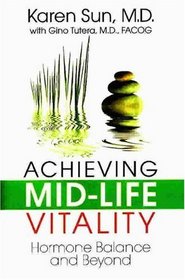Search -
Achieving Mid-life Vitality: Hormone Balance and Beyond
Achieving Midlife Vitality Hormone Balance and Beyond
Author:
Treatment If a goiter causes difficulty swallowing or breathing, or is a cosmetic problem, then thyroid hormone replacement drugs (i.e., levothyroxine or natural desiccated thyroid) will usually be given to help shrink the thyroid. If drug treatment does not work, or the goiter is too invasive, then surgery to remove all or part of the thyroid ... more »
Author:
Treatment If a goiter causes difficulty swallowing or breathing, or is a cosmetic problem, then thyroid hormone replacement drugs (i.e., levothyroxine or natural desiccated thyroid) will usually be given to help shrink the thyroid. If drug treatment does not work, or the goiter is too invasive, then surgery to remove all or part of the thyroid ... more »
ISBN-13: 9780966173574
ISBN-10: 0966173570
Publication Date: 6/1/2009
Pages: 320
Rating: ?
ISBN-10: 0966173570
Publication Date: 6/1/2009
Pages: 320
Rating: ?
0 stars, based on 0 rating
Publisher: Sunshine Publications
Book Type: Hardcover
Members Wishing: 1
Reviews: Amazon | Write a Review
Book Type: Hardcover
Members Wishing: 1
Reviews: Amazon | Write a Review
Genres:
- Health, Fitness & Dieting >> Personal Health >> Healthy Living
- Health, Fitness & Dieting >> Nutrition >> General
- Health, Fitness & Dieting >> General
- Parenting & Relationships >> Family Health




